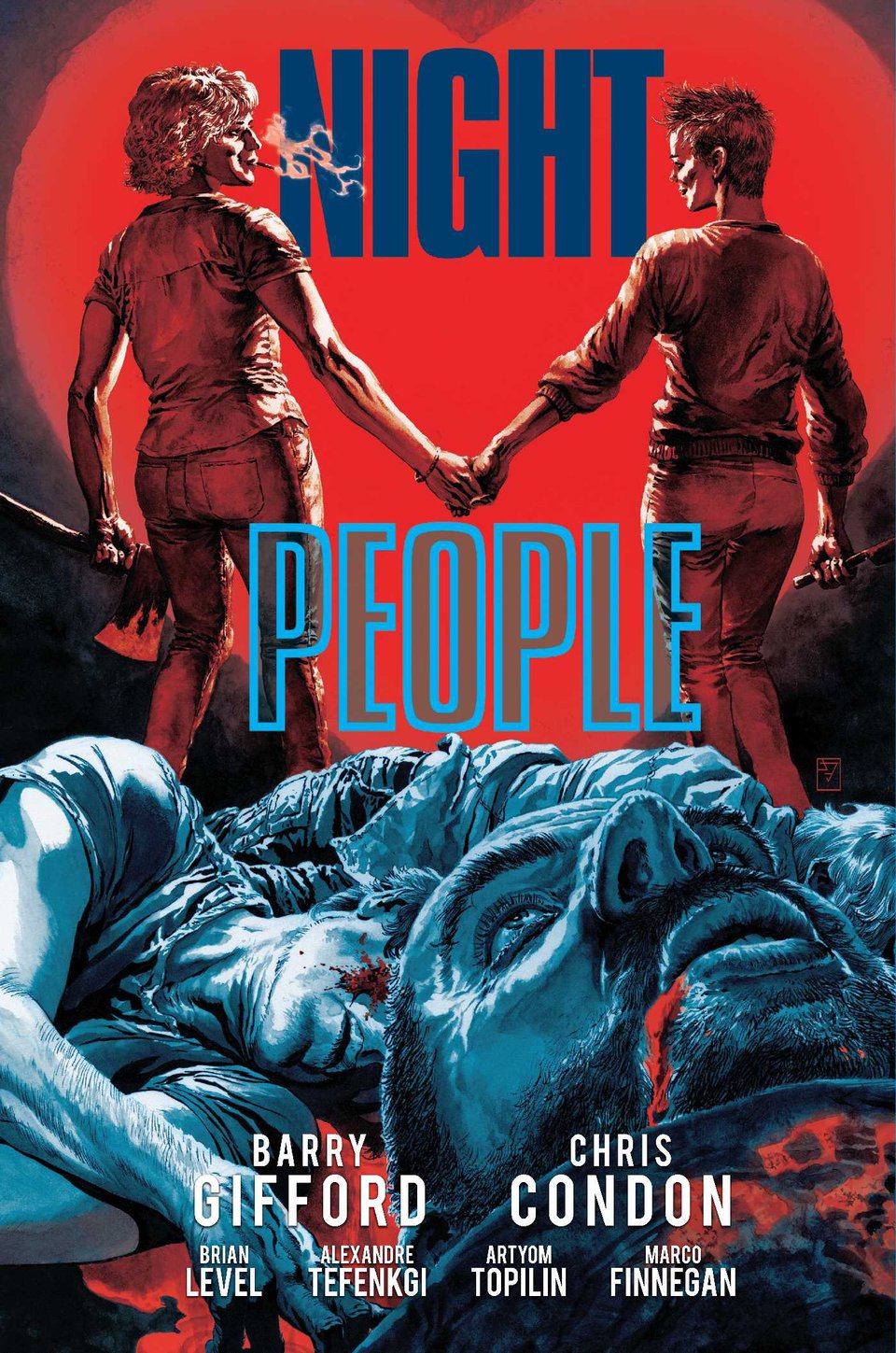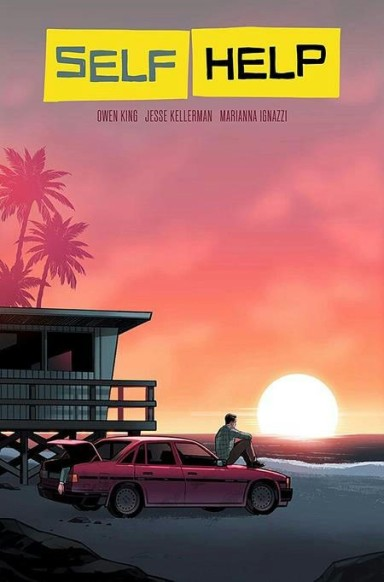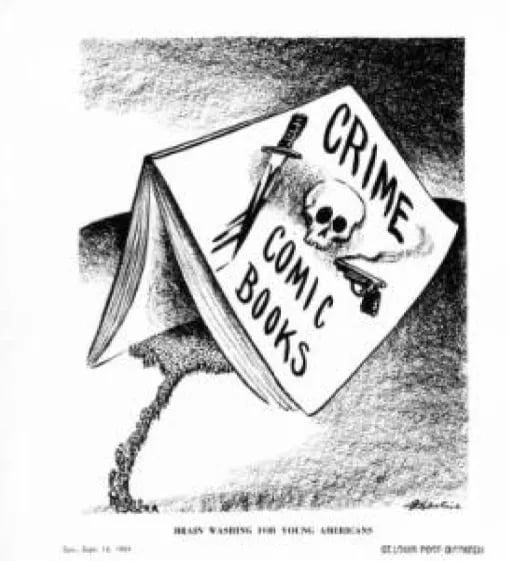This week I’ve got a couple of newer releases. I’m still working on the big round-up post of 2025 releases and the plan still is to post reviews of some of the 2025 release that I’ve read as a lead up to that post. This week, a pair of eccentric casts.

Title: Night People
Writer(s): Chris Condon, Barry Gifford
Artist(s): Brian Level, Alexandre Tefenkg, Artyom Topilin, Marco Finnegan
Availability: Print, digital, digital library services
Plot Summary: A pair of murderous lovers in Florida carrying out a bloody agenda. A perverse political and religious power struggle between a brother and a sister. An easygoing drifter who suddenly finds himself a fugitive on the run. And a bright-eyed young girl discovering her place in the cold dark world. At the end of the twentieth century, chaos and horror were the American dream.
Review:
“The devil is very sagacious. To judge by the event, he appears to have understood man better even than the Being who made him.”
― Herman Melville, The Confidence-Man"The evil is there waiting...But there is no drag like U.S. drag. You can't see it, you don't know where it comes from. Take one of those cocktail lounges at the end of a subdivision street--every block of houses has its own bar and drug store and market and liquor store. You walk in and it hits you. But where does it come from? Not the bartender, not the customers nor the cream colored plastic, nor the dim neon. Not even the tv.”
― William S. Burroughs, Naked Lunch
Night People has a small part in the origins of this project. Sometime last year I stumbled across a mention of Chris Condon’s comic adaptation of Barry Gifford’s Night People. In a bout of nostalgia for the Heroic Age of Blogging, I was surprised that I hadn’t seen it mentioned anywhere by any of the folks or places that post about crime fiction.
Barry Gifford’s Night People was a collection of four novellas published in 1992. The comic Night People is a fairly faithful adaptation of the book that distills the books to its essence. Night People was collected in 2025.
Night People was originally published the same year as Francis Fukuyama’s The End of History and the Last Man. I think this is a potentially interesting link. The 90’s were a period of time when the idea of “The End of History” gripped the discourse. The collapse of the Soviet Union, the end of the Cold War, the collapse of communism, and China’s turn towards capitalism would represent the victory of Western liberal democracy. Here’s Fukuyama himself to tell you:
"What we may be witnessing is not just the end of the Cold War, or the passing of a particular period of postwar history, but the end of history as such: that is, the end point of mankind's ideological evolution and the universalization of Western liberal democracy as the final form of human government. This is not to say that there will no longer be events to fill the pages of Foreign Affair's yearly summaries of international relations, for the victory of liberalism has occurred primarily in the realm of ideas or consciousness and is as yet incomplete in the real or material world. But there are powerful reasons for believing that it is the ideal that will govern the material world in the long run. To understand how this is so, we must first consider some theoretical issues concerning the nature of historical change."
We know now, in 2025 at the time I’m writing this, that thesis didn’t exactly play out the way Mr. Fukuyama thought it might. But this isn’t a defense of or a dunk on Fukuyama. I just want to introduce a dominant idea from that time. One of the other things we now know with 20/20 hindsight is that a lot of people and issues playing a large part in global current events were in the early stages or on the come up in this so-called End of History decade.
There is also a Flannery O'Connor quote that’s important here. Yeah, you know the one: "I think it is safe to say that while the South is hardly Christ-centered, it is most certainly Christ-haunted."
Da fuq does all this rambling have to do with a Barry Gifford book? I’ll be the first to tell you maybe nothing and it’s a hell of a reach. Or just some random ass free association.
Someone once wrote that Barry Gifford was “William Faulkner by way of B-movie film noir, porn paperbacks, and Sun Records rockabilly.” He had an affinity for the marginalized and those off the beaten path and created “an unmistakably American universe [...] populated by a huge and lovable humanity propelled on a tragic river of excess energy."
Barry Gifford’s work traveled the back roads of this country and in doing so is, in this framing, partially a rejection of Fukuyama’s thesis (not in specifics but in the general idea that was pervasive at the time). For Gifford, he only knew that the oddballs found off the beaten path were interesting characters. But they also represent all of the roots that would break through the American sidewalk and cause it to buckle in all the years since.
Gifford’s work of lesbian killers looking for one good man, a power struggle between siblings, and other cracked characters is washed in the blood of the Christ Haunted South at The End of History. Beyond all my bullshitting, the result is a macabre, violent, doomed, pulpy ride that in some warped way was a little more honest about the times. Gifford is the good shit.

Title: Self Help
Writer(s): Owen King, Jesse Kellerman
Artist(s): Marianna Ignazzi
Availability: Print, digital, digital library services
Plot Summary: A surreal and colorful world populated with two-faced talk-show hosts, cheerful Finnish mobsters, bloodthirsty white supremacists, snide English butlers, and panther-wielding Euro-trash assassins.
Down-on-his-luck rideshare driver Jerry Hauser’s existence is a bleak one…especially because every fare he picks up tells him how much he looks like uber-successful self-help guru Darren Hart. But after a twist of fate, Jerry is given the chance of a lifetime…which, if he’s not careful, may well end his lifetime.
Review:
“But truth is like a thrashing-machine; tender sensibilities must keep out of the way.”
― Herman Melville, The Confidence-Man
Observing the West Coast noir form, Self Help features a large cast of eccentric characters, all on the make, buying into the California Dream. Every adult in the story is either working an angle or is a straight up criminal. Self Help is reflexively a crime fiction story. Not only does the main character look like someone rich and famous, he’s a con man fresh out of jail. Also he owes bad people big money.
Self Help offers up a slick and fun “what if” scenario. It isn’t too concerned with digging into some of the issues it raises (class, wealth inequality, celebrity culture, issues of identity) but instead wants to mash together different crime fiction character types.
It’s hard to rate Self Help. Which leads to my biggest complaint. Vol.1 is the first half of the story. It just ends, with no volume arc wrap-up that leads to the second part. This is a little frustrating as a reading experience. I actually thought there was a problem with the file when I first read it. But it also speaks to the story that I want to see how all the set-up of volume 1 plays out.
You just read issue #11 of Bad Karma, Loose Ends & Stray Bullets: Exploring the World of Crime Comics. You can also browse the full archives of this newsletter.
